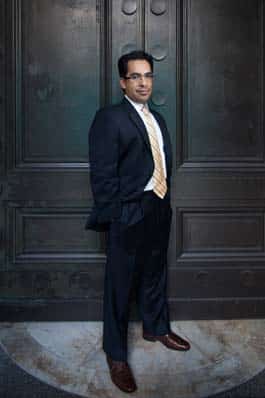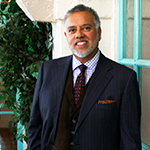
1. Finding a Niche in RMBS
España came to the United States in 1983 at the age of four when his family settled in Queens, New York. Always ambitious, he was the second in his family to attend college and the first to earn a graduate degree. He worked at Mayer Brown as a paralegal and then as an associate before leaving with a mentor to take a position with Dechert in the summer of 2011.
At Dechert, España handles complex commercial and white-collar cases and consults on corporate and regulatory matters. One of España’s strengths is his knowledge and expertise in the legal aspects of residential mortgage-backed securities (RMBS), a type of bond supported by residential real-estate holdings. These securities and their rapid growth were part of the 2008 market collapse and are now a heavily litigated and regulated sector. In 2011, España worked with his mentor, Hector Gonzalez, to represent The Bank of New York Mellon in connection with its $8.5 billion settlement with Bank of America (BoA)—one of the largest private settlements in US history—arising out of BoA affiliates’ role as originator and seller of loans underlying RMBS. In June 2013, España was part of the trial team that sought court approval of the $8.5 billion settlement in New York State Court.
2. Fannie Mae vs. Bank of America
España continued his work on RMBS cases and his representation of BNY Mellon. Another win came in 2010 when a judge rejected a claim against BNY Mellon associated with the 2007 Chapter 11 bankruptcy of futures commission merchant Sentinel Management Group, Inc. BNY Mellon acted as a custodial and clearing bank for Sentinel. The litigation trustee for the group sought to recover hundreds of millions of dollars of cash and collateral from BNY Mellon that had been used by the group to secure a loan made by BNY Mellon claiming, among other things, fraudulent transfers and equitable subordination. After a three-week trial, the judge rejected the trustee’s claims against España’s clients.
In January of 2013, España worked alongside partner Barton Winokur to represent Fannie Mae in its negotiations to settle RMBS-related claims against BoA. España and Winokur settled repurchase claims and obtained a settlement for Fannie Mae of $6.75 billion for outstanding and future claims. BoA repurchased 30,000 bad mortgages that were bundled into RMBS deals and then purchased and guaranteed by Fannie Mae. All told, the deal
brought a settlement of $10.3 billion in January of 2013.
3. Pro Bono Fulfillment
In addition to his nearly 3,000 annual billable hours, España dedicates another 200 to 300 to pro bono cases. “I find pro bono work especially fulfilling,” he says. “A lot of my work is representing corporations in disputes centered mainly around money. The cases are important, but it’s different when you know you can make a real and direct difference in someone’s life.” The gratis work—considered by España a moral obligation—often helps low-income individuals and immigrants.
Up Close & Personal
with
Mauricio A. España
As a child, what did you want to be when you grew up? It may sound crazy, but I wanted to be a lawyer.
What do you do when you’re not at work? I spend time with family and friends
and travel.
What’s one place you’ve always wanted to visit? I’ve always wanted to visit every country in South America.
España started his pro bono career at Mayer Brown, where he sat on the pro bono committee and received the pro bono lawyer of the year award in 2011. His most notable cases have dealt with asylum issues and landlord-tenant disputes. He’s also represented nonprofits that find themselves in legal trouble or are seeking compensation or reimbursement from former board members or executives.
4. Helping When Needed
In 2010, España discovered a troubling case that had been passed around from lawyer to lawyer. Two Colombian brothers had entered the United States at ages 14 and 16 and were seeking asylum. Their case proceeded slowly and due to administrative burdens and errors they had gone an entire decade without a hearing. “Without a hearing, they were in limbo. They couldn’t go to school, they couldn’t work; something had to be done,” España says. He took the case and got them a hearing, but one of the brothers had moved from New York to Boston. There, he was arrested after a domestic dispute. Although no charges were filed, the police reported the Colombian citizen to immigration who took him into custody where he was held until his hearing date—which was scheduled for two years later. España traveled to Boston for three bond hearings, performed what he calls an “impromptu evidentiary hearing,” and convinced the judge that the man wasn’t a threat to society or his wife. He was released on a $1,300 bond. A year later, a full-blown hearing in immigration court led to full asylum for both brothers. “These pro bono cases are important because we can help people who are often lost in the system and don’t have the resources to get the help they need without this kind of assistance,” España says.
In another memorable case, España represented an indigent New York resident who had lost his housing and fought his landlord through Legal Aid. Ambiguity in the lease agreement gave aggressive lawyers an opportunity to evict him, and the unemployed and disabled citizen found himself forced to pay market value rent in New York City instead of his arranged monthly fee of $200. España intervened and negotiated permanent housing for the same low monthly rate.
España also serves companies who are based in or have divisions in Latin America and says his Spanish fluency has “become an asset” in his career. While there are still too-few Latino partners in major firms, España is proud to be one of the Hispanic partners at Dechert. Still, he hopes other young Latinos enter the profession. “When you compare it to the general population, there are very few Hispanic lawyers,” he says. “And those who make it up the ranks are even smaller in number.” To be sure, making partner at Dechert is an impressive achievement for any young lawyer. España credits his success with many friends and colleagues who have invested in his life over the years. “Many people have shown me the ropes, given me the opportunity to excel, and trusted in me to get things done,” he says. España’s accomplishments are many. In 2012, Super Lawyers recognized him a “Rising Star” in the area of securities litigation, white-collar defense, and business litigation. He also won the 2012 Pro Bono Publico Award from The Legal Aid Society. Despite the success, perhaps España’s most important accomplishment is becoming a father—his first daughter was born in 2012.

